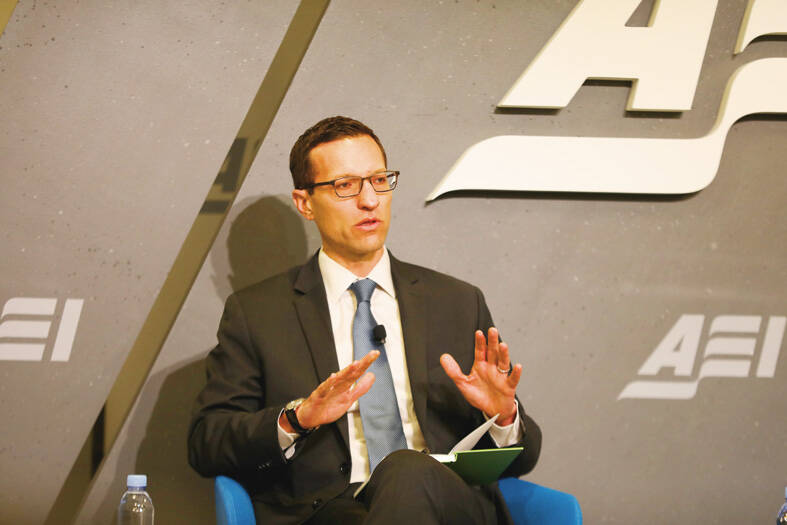The US aims to “ensure that it is not easy or cost-free” for China to use military aggression against Taiwan, a senior US defense official told a seminar in Washington on Thursday.
China is unlikely to attempt a rash invasion of Taiwan in 2027 — a goal assumed by some analysts — but the US would continue to strengthen its regional deterrence in the Indo-Pacific region to ensure that China is aware that such an attempt would be very costly, US Assistant Secretary of Defense for Indo-Pacific Security Affairs Ely Ratner said.
He made the comments during a seminar titled “Unpacking the Pentagon’s 2022 China Military Power Report,” held by the Washington-based American Enterprise Institute think tank.

Photo: CNA
Ratner said he thinks that next year is “likely to stand as the most transformative year in US force posture in the [Indo-Pacific] region in a generation.”
“We’re going to be making good on a strategic commitment” on deterrence that is “more lethal, more mobile, more resilient and exactly reinforcing” to “make some of these rapid, low-cost invasions nearly impossible,” Ratner said.
“Our goal is to ensure that that is never easy for them to do rapidly or cost-free,” he added, referring to Beijing potentially trying to seize Taiwan by force.
Beijing has said it aims to achieve certain milestones in the development of its military in the years 2027, 2035 and 2049, with the goal of displacing the US as the world’s top military power by 2049.
Some analysts have cited 2027 as when China might attempt an invasion of Taiwan, although Ratner disagrees.
There is no indication that China would attack Taiwan in 2027, although there is a consensus in the US Department of Defense that Taiwan’s regional deterrence must be urgently strengthened and maintained, Ratner said.
US Deputy Assistant Secretary of Defense for China Michael Chase, who also attended the seminar, quoted former US Indo-Pacific command head admiral Philip Davidson in reference to the US’ role in the region.
The US must ensure that when Beijing examines the Taiwan issue, it concludes that “today is not the day” to become militarily aggressive against Taiwan, he said.
Ratner referred to the Taiwan-related provisions in the Fiscal Year 2023 National Defense Authorization Act, saying that the authorization of US$10 billion in military aid for Taiwan over the next five years symbolizes cooperation between US Democrats and Republicans toward Taiwan’s defense.
Bipartisan support in Washington sends a clear message to Beijing that the more it engages in acts of intimidation and coercion, the more urgently Washington would sense that it must assist Taiwan in bolstering its deterrence and military capabilities, he said.
Asked whether Washington would object to a future US House of Representatives speaker visiting Taiwan — given China’s reaction when House Speaker Nancy Pelosi visited in August — Ratner said the decision would be made by the members of the US Congress and Taiwan.
The speaker would also be advised to assess whether such a visit is worth any predictable consequence, he added.

INVESTIGATION: The case is the latest instance of a DPP figure being implicated in an espionage network accused of allegedly leaking information to Chinese intelligence Democratic Progressive Party (DPP) member Ho Jen-chieh (何仁傑) was detained and held incommunicado yesterday on suspicion of spying for China during his tenure as assistant to then-minister of foreign affairs Joseph Wu (吳釗燮). The Taipei District Prosecutors’ Office said Ho was implicated during its investigation into alleged spying activities by former Presidential Office consultant Wu Shang-yu (吳尚雨). Prosecutors said there is reason to believe Ho breached the National Security Act (國家安全法) by leaking classified Ministry of Foreign Affairs information to Chinese intelligence. Following interrogation, prosecutors petitioned the Taipei District Court to detain Ho, citing concerns over potential collusion or tampering of evidence. The

Seventy percent of middle and elementary schools now conduct English classes entirely in English, the Ministry of Education said, as it encourages schools nationwide to adopt this practice Minister of Education (MOE) Cheng Ying-yao (鄭英耀) is scheduled to present a report on the government’s bilingual education policy to the Legislative Yuan’s Education and Culture Committee today. The report would outline strategies aimed at expanding access to education, reducing regional disparities and improving talent cultivation. Implementation of bilingual education policies has varied across local governments, occasionally drawing public criticism. For example, some schools have required teachers of non-English subjects to pass English proficiency

‘FORM OF PROTEST’: The German Institute Taipei said it was ‘shocked’ to see Nazi symbolism used in connection with political aims as it condemned the incident Sung Chien-liang (宋建樑), who led efforts to recall Democratic Progressive Party (DPP) Legislator Lee Kun-cheng (李坤城), was released on bail of NT$80,000 yesterday amid an outcry over a Nazi armband he wore to questioning the night before. Sung arrived at the New Taipei City District Prosecutors’ Office for questioning in a recall petition forgery case on Tuesday night wearing a red armband bearing a swastika, carrying a copy of Adolf Hitler’s Mein Kampf and giving a Nazi salute. Sung left the building at 1:15am without the armband and apparently covering the book with a coat. This is a serious international scandal and Chinese

TRADE: The premier pledged safeguards on ‘Made in Taiwan’ labeling, anti-dumping measures and stricter export controls to strengthen its position in trade talks Products labeled “made in Taiwan” must be genuinely made in Taiwan, Premier Cho Jung-tai (卓榮泰) said yesterday, vowing to enforce strict safeguards against “origin laundering” and initiate anti-dumping investigations to prevent China dumping its products in Taiwan. Cho made the remarks in a discussion session with representatives from industries in Kaohsiung. In response to the US government’s recent announcement of “reciprocal” tariffs on its trading partners, President William Lai (賴清德) and Cho last week began a series of consultations with industry leaders nationwide to gather feedback and address concerns. Taiwanese and US officials held a videoconference on Friday evening to discuss the